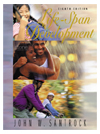 |  Life-Span Development, 8/e John W. Santrock,
University of Texas - Dallas
Infancy Cognitive Development in Infancy
Chapter ObjectivesI.Grasp the four stages in Piaget's theory of cognitive development, and the role the concepts of assimilation, accommodation, and schemes play in the individual's adaptation. |
 |  |  | II.Describe Piaget's sensorimotor stage of development, including the six substages and object permanence. |
 |  |  | III.Discuss the contributions of Piaget's theory to the perceptual and conceptual development of infants, and then discuss how more modern researchers might modify his views. |
 |  |  | IV.Explain how research with infants has demonstrated the role of conditioning in early cognitive abilities. |
 |  |  | V.Describe the concepts of habituation and dishabituation. |
 |  |  | VI.Understand the infant's memory capabilities and how that relates to imitation. |
 |  |  | VII.Discuss the history of intelligence testing, the tests that are used to test infant intelligence, and the relationship between infant cognitive abilities and cognitive functioning in childhood and adolescence. |
 |  |  | VIII.Describe what language is and how it relates to the concept of infinite generativity. |
 |  |  | IX.Explain the developmental milestones in language development including receptive vocabulary, the holophrase hypothesis, and telegraphic speech. |
 |  |  | X.Describe how biological development influences the development of language and cite evidence to support Chomsky's view of language development. |
 |  |  | XI.Describe the behavioral view of language development and be able to indicate how environmental factors influence the development of language. |
|



 2002 McGraw-Hill Higher Education
2002 McGraw-Hill Higher Education